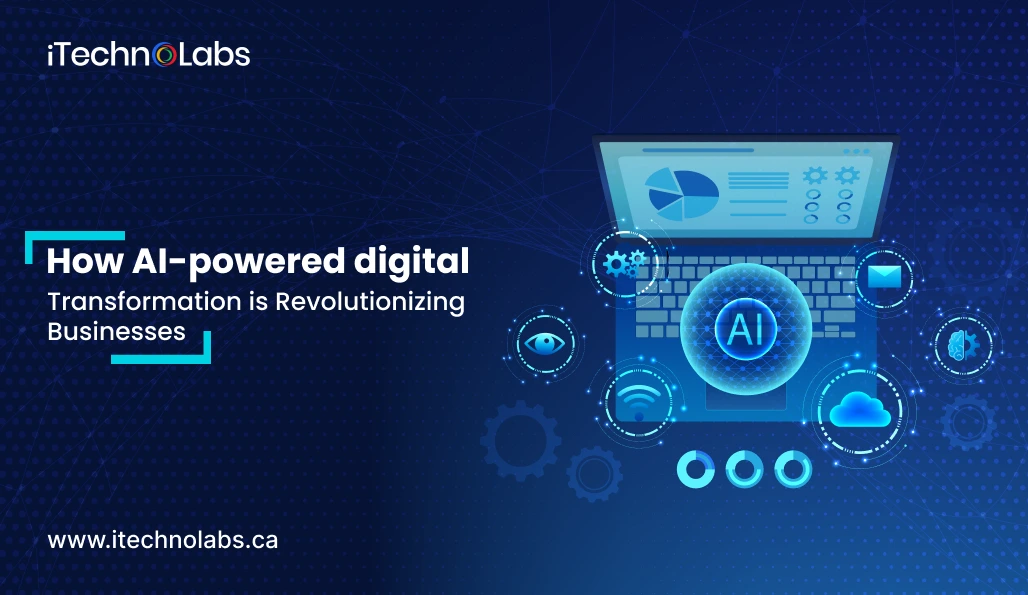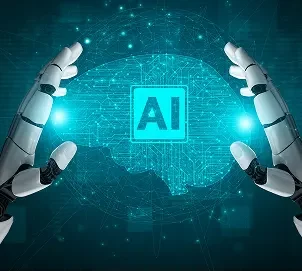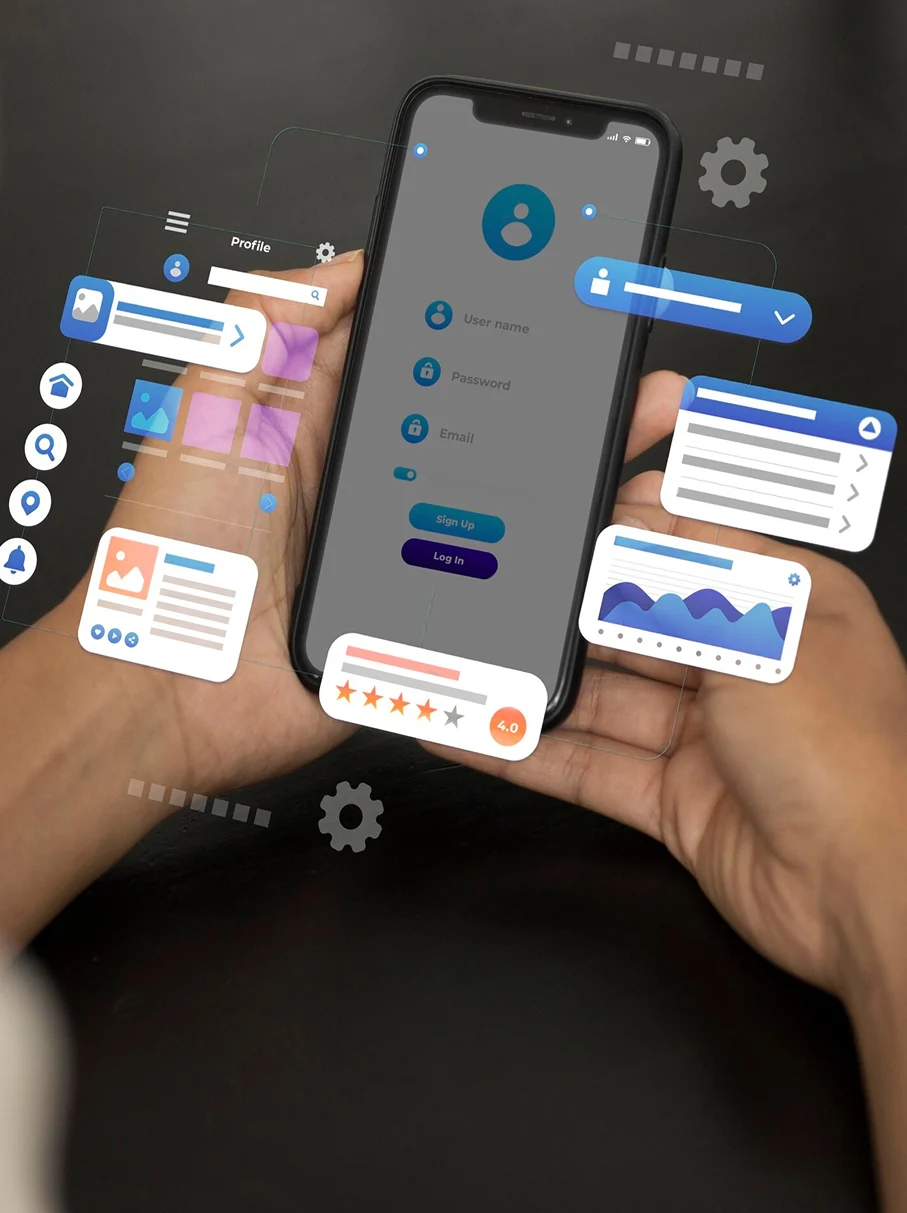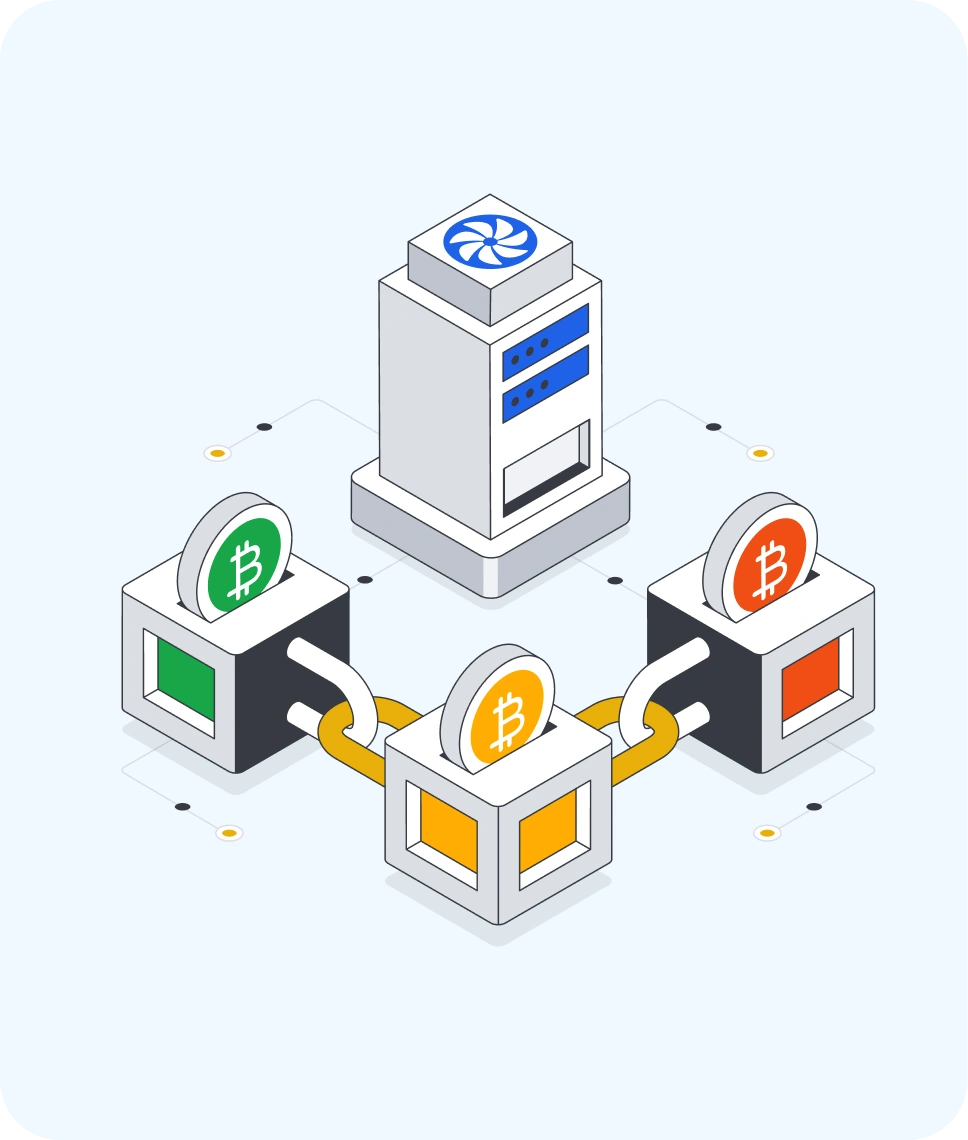Digital transformation is helping businesses around the world. It is allowing them to change according to the evolving market faster than ever. AI is giving this digital transformation a further boost. Digital adoption, when mixed with AI, helps companies. It increases their productivity and makes smarter decisions. In healthcare, AI boosts diagnostic accuracy. In fintech, it spots fraud and improves security. AI in manufacturing enables supply chain optimization and predictive maintenance. But retail benefits from a personalized customer experience. Read this blog to learn more about the components that drive digital adoption. Also, you will learn about its uses, strategies to drive digital adoption, and more.
Components Driving Businesses Towards Digital Transformation
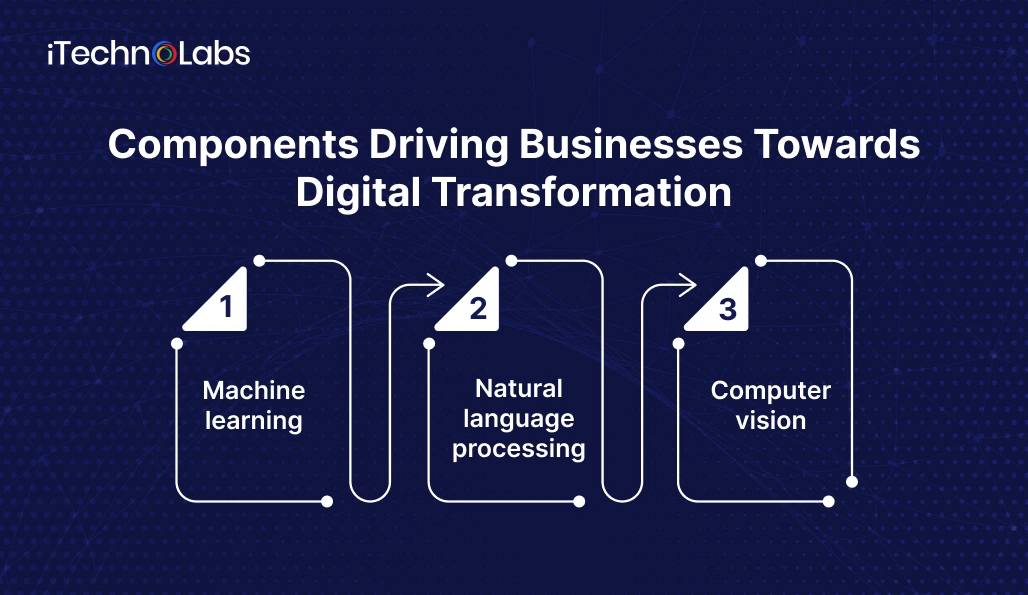
The following are some of the components that drive digital transformation in businesses around the world:
1. Machine learning
Machine learning is an essential component that drives digital innovation at any organization. With the help of machine learning, computers get the ability to analyze huge amounts of data instantly and also learn from it. This lets companies set up their draining tasks for automation and make their customers’ experience better. These algorithms help businesses boost efficiency, adapt quickly to market changes. Also, it provides a top-notch customer experience.
2. Natural language processing
Natural language processing is the next important component. It helps businesses adopt digital innovation. It helps computers to understand and even generate human language. It is used in a diverse range of areas such as chatbots, sentiment analysis, and language translation. By implementing AI algorithms for their digital adoption, businesses can make their customer interactions better. Apart from this, they can improve their processes and unlock the latest insights from large amounts of data.
3. Computer vision
Computer vision is that branch of AI that allows computers to understand and respond to visual data. This component plays one of the most important roles in multiple applications. Some notable ones are object detection, facial recognition, and autonomous vehicles. It enhances the capability of a business to automate daily operations. Businesses can partner with a renowned computer vision development services company. In this way, they can build the best solutions that will streamline all their operations.
Use Cases of AI Across Industries
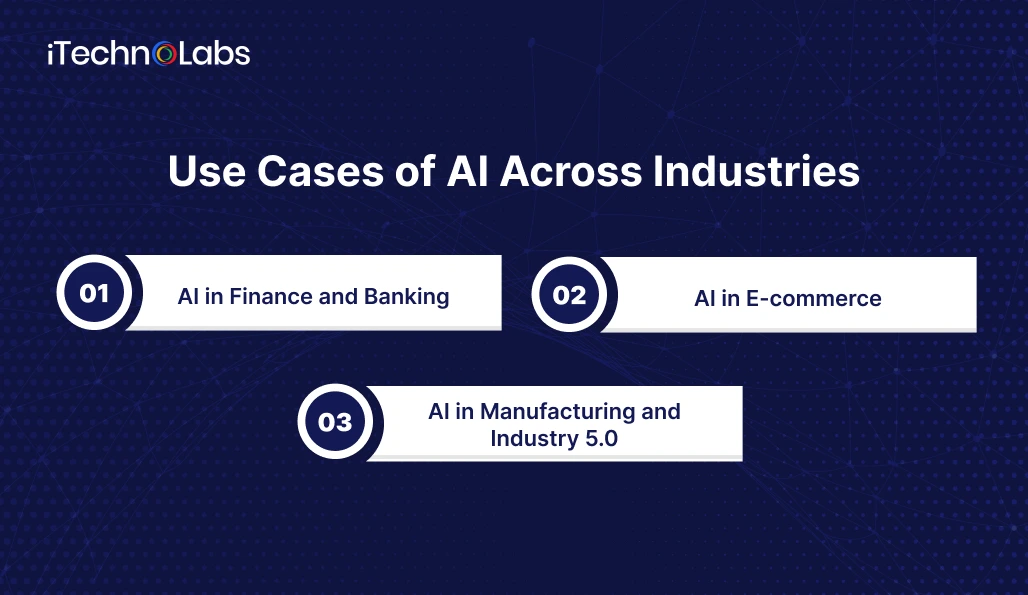
There are many industries in the world that are benefiting from using AI in their business adoption. Below, you can see some of the popular industries using AI in their digital innovation strategy:
-
AI in Finance and Banking
AI in finance and banking helps to streamline wealth management. This improves the decision-making process and delivers great customer experiences. Using AI, financial institutions can automate routine tasks. Also, AI eliminates the risk and innovates services swiftly to meet market demands quickly.
As per the report by Deloitte, generative AI, the most powerful branch of AI, can significantly impact the financial service industry. It is expecting a 14% increase in front-office productivity for the top 14 investment banks globally.
-
AI in E-commerce
Another industry that AI is changing forever is e-commerce. It is helping e-commerce companies improve their tasks and achieve a better level of efficiency. Artificial intelligence is enhancing customer experience through automation and advanced analytics. The AI in the e-commerce market is projected to reach $22 billion by 2032 from $5.82 billion in 2022.
AI in e-commerce analyzes large volumes of customer data in real-time to recommend products. Further, the chatbots offer 24*7 support to customer and answer all of their queries.
-
AI in Manufacturing and Industry 5.0
AI tools have become a critical component of Industry 5.0. It is changing processes in the manufacturing industry. It enables manufacturers to create smart factories. AI is revolutionizing predictive maintenance and defect detection. Also, it is helping in autonomous vehicles and quality control.
AI regularly monitors all equipment and can find out if any is going to fail in the future. This lets the concerned team take timely action, reduce the costs, and prevent uncertain downtimes. It ensures smooth operations in the smart factories.
Suggested article: Top AI Development Tools and Frameworks Every Business Should Know
Strategies to Drive Digital Adoption
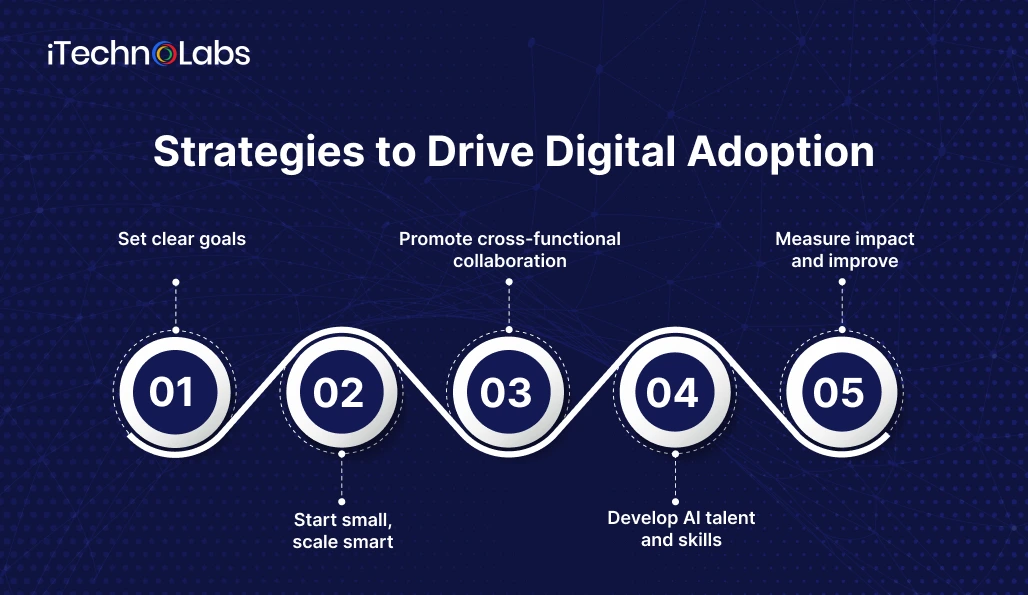
Here are the strategies you can use to drive AI-powered digital transformation in your business:
1. Set clear goals
The first step in your digital adoption strategy with AI should be to make clear and measurable goals. They should align with your company’s objectives and not be randomly created. Whether it’s improving customer experience or increasing revenue, having clarity will help you achieve your goals easily.
2. Start small, scale smart
Before implementing AI-powered digital transformation across all processes, first try it on a smaller level. Once you succeed there, then proceed further on a larger level. This approach allows you to test the AI model, find out if it’s really effective or not.
3. Promote cross-functional collaboration
Engage all the departments and shareholders to align with AI objectives with broader business goals. This collaboration will ensure that every employee raises their unique concerns, which can be addressed initially.
4. Develop AI talent and skills
Don’t forget to invest in training your employees to use AI effectively. It’s only after they get trained that you will be able to generate most ROI from this technology.
5. Measure impact and improve
Use KPIs to see how AI tools are performing and make sure you analyze their performance in a timely manner. It can be weekly or monthly. If you find any issues or areas of improvement, then immediately work on them.
Future of AI in Digital Transformation
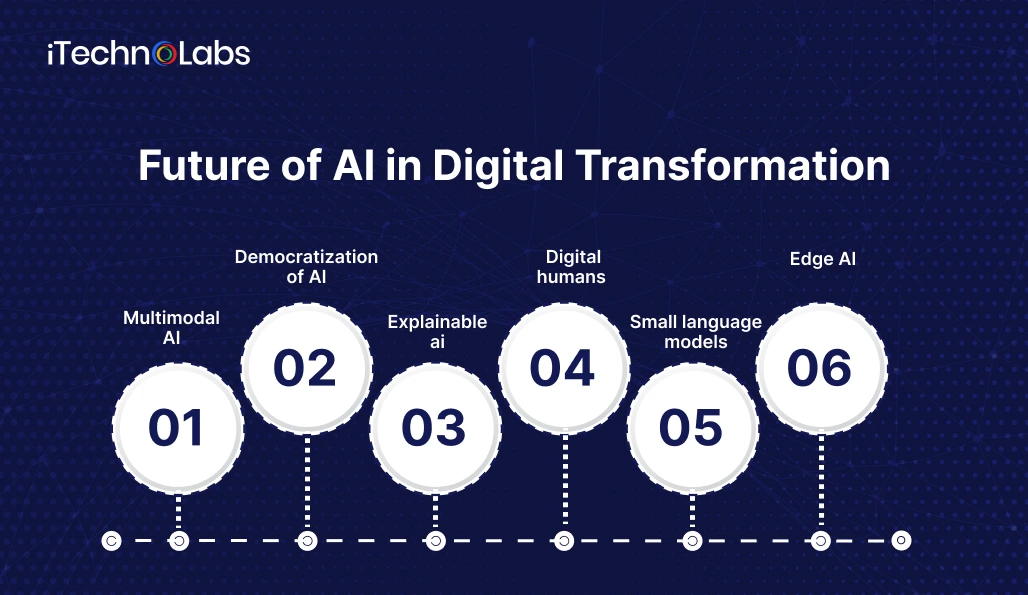
This is only the start; AI-powered digital transformation will permanently alter the business environment in the future. Businesses will be able to tailor customer interactions, optimize supply chains, and forecast market trends in real time thanks to AI-powered insights. This is how artificial intelligence will appear in digital adoption in the future:
-
Multimodal AI
Multimodal AI can process and interpret information from many sources. The sources can be text, images, and videos. It has a better understanding of the world and enables a richer experience with AI. For example, the virtual assistants respond to facial expressions.
-
Democratization of AI
In 2025, everyone who has a smartphone can access AI tools without any cost. For their daily activities, they can use it even if they don’t have technical knowledge. This will lead to more inventions in AI as more and more people can use the power of AI.
-
Explainable AI
Humans want to know how the AI thinks and gives the answers. In the future, this will be a reality as AI tools will explain how they reached a particular conclusion.
-
Digital humans
Digital humans and digital twins will allow for advanced simulations and interactions. This will open avenues for innovation across multiple sectors.
-
Small language models
You must have heard of large language models. In the future, there will be small language models too, which will use fewer resources, making them accessible to more people than ever.
-
Edge AI
Many people haven’t heard of this, but edge AI is one of the newest AI technologies. It processes data and helps people make decisions on the spot. Instead of only relying on cloud servers, it keeps information on local devices for easy access.
Also, read: AI in the Workplace: Driving Innovation and Efficiency in 2025
Conclusion
No company can survive in today’s time without digital innovation with the help of AI. To quickly implement digital transformation, companies are using AI. AI-driven digital transformation provides various benefits such as increased profitability, enhanced analytics, automated workflows, improved performance, better efficiency, enhanced security, and more. Along with the benefits come multiple challenges, such as data quality, talent shortage, high cost, risk management, and more.
FAQs
1. How is AI revolutionizing business?
AI is changing how businesses operate. It helps companies streamline workflows. It also boosts security and enhances customer experiences. Plus, AI enables predictive maintenance.
2. How is AI changing the digital marketing sector?
AI helps digital marketers by giving them insights about their customers. This lets them create personalized campaigns and boost revenue.
3. Will AI replace digital marketing?
Now it’s not going to replace it completely, but transform it by automating routine tasks, providing customer insights, and enhancing customer experience. In the future, digital marketers will be able to focus on value-driven work, such as creative work, and making strategies for the future.

